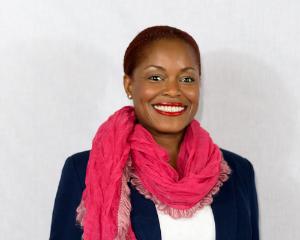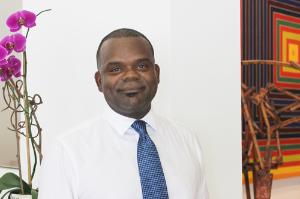Sitting at the “crossroads of the Americas,” Miami “is a unique vantage point from which to broaden our practice and our understanding of American Studies,” says Donette Francis, associate professor of English and the new director of the interdisciplinary Program in American Studies.
Taking the reins this semester, Francis has two broad goals: making American Studies “the interdisciplinary hub that gives visibility to Miami-centered courses” throughout the College of Arts & Sciences; and strengthening the “professional appeal” of the American Studies major.
 |
She envisions “Miami-based internships that would count toward senior projects, allowing students to parlay pre-professional training into the local job market.” This would help her achieve both of her goals.
Although her research on the multi-linguistic Caribbean and its Diasporas is housed in the Department of English, Francis earned her Ph.D. in American Studies from New York University. “The insistence on comparative American Studies is the texture of my scholarship,” she says.
“Through multidisciplinary approaches, American Studies provides an opportunity to gain a critical understanding of the historical cultural formation of the U.S. and its contemporary legacies. Inquiries into how power works – and how that manifests in terms of race, ethnicity, gender and class – are implicit critical and pedagogical practices,” Francis says. “We look at culture and cultural productions like music, literature, new technologies to answer the question, ‘What is America?’”
Francis is grateful to “inherit a program that already works through active faculty collaborations.” UM’s “amazing archival collection” – such as the Helen C. Purdy Florida Collection and the recently acquired Pan American World Airways archives – are also outstanding resources for the American Studies Program, she says.
Francis believes that American Studies is a critical part of UM’s positioning itself to become “a major national and global institution of research and learning.”
“My initiatives will further build faculty investment and profile in American Studies through course development, loyalty and identity,” she says, adding that dual faculty appointments in American Studies will be key.
“American Studies offers a unique opportunity to look at problems within a multidisciplinary and interdisciplinary framework” while it “emphasizes thinking about how knowledge relates to the social world,” says Francis.
She is looking forward to working with the directors of the other interdisciplinary studies programs, such as Latin American Studies, Women’s and Gender Studies, and Africana Studies.
 |
Her colleague in the Department of English, Professor David Ikard, has just assumed the directorship of the Africana Studies Program.
His plans for the program are “ultimately about trying to encourage students, across racial lines, to become more politically and intellectually self-aware,” Ikard says.
Courses will encourage students to “think of their own racial, ideological perceptions of what is real,” leading them to understand that when they are studying African and African American experiences, they are really studying the human condition.
“In other words, black experiences are not alien or ‘othered,’ in relation to the whites,” Ikard says, adding that students will have opportunities to explore “how African and African American experiences are filtered through various cultural lenses.”
Ikard wants Africana Studies majors and minors – and any students who take classes through the program – to “get a broad intellectual perspective on how Africans and African Americans have indelibly marked what it means to be an American, a citizen of the world, and, most importantly, a human being.”
He explains that diversity “enhances and enriches the educational experience, rather than detracts from it.” He notes further, that “the push for diversity is not about vapid inclusiveness, but about exposing our students to different modes of knowledge and cultural perspectives that will ultimately pay dividends far beyond their professional pursuits.”
Africana Studies majors have two prerequisites: Introduction to Africana Studies, and two history courses on African or African American history. Other courses that fulfill the requirements cover topics from Rastafarianism to black theatre.
Ikard himself is planning to teach a class on race in sports.
He will bring his considerable expertise on African American literature, with a focus on hip hop culture, black feminist criticism and black masculinity, to the classroom.
Ikard has written three books, the most recent is Blinded by the Whites: Why Race Still Matters in the 21stCentury. This book investigates the new, and more nuanced, racial dynamics in the current era – and considers how blacks can navigate these dynamics in constructive and empowering ways.
Ikard uses his own personal experiences – growing up in the deep South in the 1970s, and as a parent in an “increasingly brown America” – as political touchstones.
“The … reality here is that a postracial/colorblind society is unrealizable at this point in history because the discourse of white normalcy relies on the idea of black abnormality for its cultural capital,” he asserts.
For example, he notes, the public generally associates welfare with the “black poor, and particularly unwed black mothers” – in reality, however, the majority of welfare recipients are white.
Nevertheless, Ikard is optimistic about the future for his children. “However idealistic it may be, I feel an incredible obligation to improve the society in which my children live: to make it a place in which they are seen and heard as human beings, irrespective of their imposed racial, gender, class, and sexual identities.”
The Africana Studies Program will certainly benefit from Ikard’s work toward this vision.
August 13, 2014

